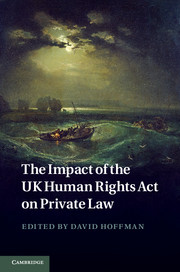Book contents
- Frontmatter
- Contents
- Contributors
- Foreword
- Preface
- Acknowledgements
- Table of cases
- Table of statutes
- Table of statutory instruments
- Table of European Union Legislation
- Abbreviations
- 1 Introduction
- 2 Mapping horizontal effect
- 3 Public authorities: what is a hybrid public authority under the HRA?
- 4 Statute law: interpretation and declarations of incompatibility
- 5 Precedent
- 6 Tort design and human rights thinking
- 7 Privacy: the development of breach of confidence – the clearest case of horizontal effect?
- 8 Nuisance
- 9 Defamation
- 10 Discrimination law
- 11 Damages: private law and the HRA – never the twain shall meet?
- 12 Property and housing
- 13 Commercial law
- 14 Restitution
- 15 Insolvency
- 16 Employment law
- 17 Civil procedure: Article 6 – a welcome boost to the development of English procedural law?
- 18 Conclusions
- Index
- References
5 - Precedent
Published online by Cambridge University Press: 05 November 2011
- Frontmatter
- Contents
- Contributors
- Foreword
- Preface
- Acknowledgements
- Table of cases
- Table of statutes
- Table of statutory instruments
- Table of European Union Legislation
- Abbreviations
- 1 Introduction
- 2 Mapping horizontal effect
- 3 Public authorities: what is a hybrid public authority under the HRA?
- 4 Statute law: interpretation and declarations of incompatibility
- 5 Precedent
- 6 Tort design and human rights thinking
- 7 Privacy: the development of breach of confidence – the clearest case of horizontal effect?
- 8 Nuisance
- 9 Defamation
- 10 Discrimination law
- 11 Damages: private law and the HRA – never the twain shall meet?
- 12 Property and housing
- 13 Commercial law
- 14 Restitution
- 15 Insolvency
- 16 Employment law
- 17 Civil procedure: Article 6 – a welcome boost to the development of English procedural law?
- 18 Conclusions
- Index
- References
Summary
Section 2(1) of the HRA requires that courts and tribunals determining an issue concerning Convention rights must ‘take into account’ any ‘judgment, decision, declaration or advisory opinion of the European Court of Human Rights’. It is clear, therefore, that, when issues of Convention rights arise in private law cases, account must be taken to decisions of the European Court of Human Rights (Strasbourg court) as to the definition of the Convention right. What is less clear, however, is the extent to which national courts are required to take these decisions into account. Two main issues arise which will be discussed in this chapter. First, we need to determine how far domestic courts should adhere to the definitions of Convention rights provided by the Strasbourg court. Second, we need to determine the extent to which the need to take decisions of the Strasbourg court into account has altered rules regarding precedent, allowing courts to follow decisions of the Strasbourg court as opposed to the binding precedent of a higher or coterminous domestic court.
It will be argued that the HRA has altered the way in which decisions of the Strasbourg court are to be regarded in private law. However, it has done so in a manner that has created greater flexibility than is found in public law. Private law courts are less likely to regard decisions of the Strasbourg court as providing a ceiling to the definition of Convention rights. As such, courts have regarded themselves as free to develop principles of the common law, even those based upon or which mirror Convention rights, beyond the definition of the right provided by the Strasbourg court. Decisions of the Strasbourg court are to be regarded more as a springboard than as a straitjacket. This can be explained due to the different constitutional positions of the court when developing principles of the common law as opposed to reading and giving effect to legislation, declaring legislation incompatible with Convention rights or concluding that a public authority has acted unlawfully by contradicting Convention rights. Courts have long enjoyed an inherent jurisdiction to develop the common law. As such, no issue as to possible breaches of the separation of powers arises. In addition, there is no indirect challenge to parliamentary sovereignty. Parliament is free to overturn a development of the common law through the enactment of legislation.
- Type
- Chapter
- Information
- The Impact of the UK Human Rights Act on Private Law , pp. 91 - 109Publisher: Cambridge University PressPrint publication year: 2011
References
- 1
- Cited by



